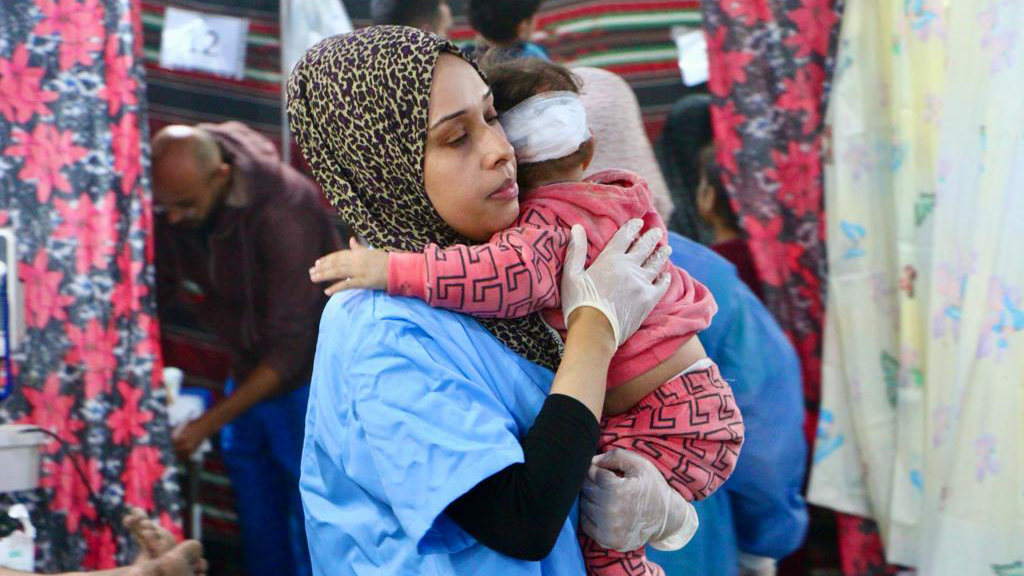Fewer and fewer hospitals in the Gaza Strip are able to continue operating as Israeli attacks persist. On December 12, Richard Peeperkorn from the World Health Organization (WHO) office for the occupied Palestinian territories reported to the press that only 11 out of 36 hospitals in Gaza were still partially running. Among them, Kamal Adwan Hospital was the only functioning hospital located in northern Gaza.
By that point, Kamal Adwan was already under siege by the Israeli Occupying Forces (IOF), leading to a raid on the building and intimidation of patients, as warned by the Ministry of Health in Gaza. Those at the hospital were repeatedly rounded up on the hospital grounds. Many of the staff and patients were detained.
Reportedly, the soldiers prevented health workers from delivering emergency care, leading to the death of two people. IOF actions also impaired the delivery of other essential care, such as feeding newborns in the neonatal department. On December 14, reports came in about evacuation orders being issued to Kamal Adwan Hospital, demanding that people leave the building in a matter of hours.
Another hospital directly in the line of fire is Al-Awda Hospital in Jabalya, which, by December 13, had been under siege for nine days, targeted by a sniper. The sniper killed both staff members and people attempting to reach the building, injuring several others. More than 100 people are trapped inside the hospital, living on critically low supplies.
Doctors working for Awda-operated hospitals across the Gaza Strip express extreme concern for their patients, whose physical and mental health is stretched to the limits. Women and children are particularly affected by the ongoing attacks, facing prolonged consequences of the violence. In a voice message shared with Action Aid, a doctor from one of the Awda hospitals told the story of a pregnant woman who, within days, lost her baby, other children, and her husband due to the Israeli attacks.
“This woman had a simple dream of a family, and of a safe place for her birth… Now, she’s suffering with her mental health after losing her newborn and family; the family she will know she lost after going back home, which will add to her suffering,” the doctor told Action Aid.
Although hospitals are no longer a safer place compared to other locations, those whose homes have been destroyed have no choice but to seek shelter there. Similar to schools and UNRWA shelters where thousands are taking refuge, overcrowding poses a significant public health risk. When the WHO team assessed the situation at Al-Ahli Hospital in Gaza City, they found it completely filled with people.
“I worked for 7 ½ years in Afghanistan and have seen some pretty grim scenes, but I have never seen scenes like this in my life,” said Peeperkorn upon returning from the mission in Gaza.
Read more: WHO Executive Board adopts resolution calling for unimpeded flow of aid into Gaza
The WHO convoy itself experienced attacks and intimidation by the IOF. In addition to being hit with bullets when entering Gaza City, the convoy was inspected by soldiers. Two staff members from the Palestinian Red Crescent Society (PRCS) were detained for more than an hour, delaying the delivery of essential supplies. The United Nations agency reported, “WHO staff saw one of them being made to kneel at gunpoint and then taken out of sight, where he was reportedly harassed, beaten, stripped and searched.”
The violence at the checkpoint continued during the convoy’s return journey, with armed soldiers inspecting patients who could not leave the ambulance. One PRCS member was detained for a second time, forcing the convoy to proceed without him to protect the patients. He was released only after UN intervention. Following his release, he recounted to WHO staff that while detained, “he was harassed, beaten, threatened, stripped of his clothes, and blindfolded. His hands were tied behind his back, and he was treated in a degrading and humiliating manner. Once released, he was left to walk towards the south with his hands still tied behind his back, and without clothes or shoes.”
The ongoing violence against health workers during the war on Palestine continues to prompt solidarity actions among their counterparts in other countries. After a statement delivered to the WHO Executive Board on behalf of Ilyas Al-Jelda, Vice-President of the General Trade Union of Health Workers in Gaza, Public Services International (PSI) reiterated that health workers, buildings, and patients should never be legitimate military targets.
PSI General Secretary Daniel Bertossa called once again for a permanent ceasefire, stating, “Public service workers across the world will not stay silent as we watch our fellow health professionals face unspeakable violence and destruction.”
People’s Health Dispatch is a fortnightly bulletin published by the People’s Health Movement and Peoples Dispatch. For more articles and subscription to People’s Health Dispatch, click here.





